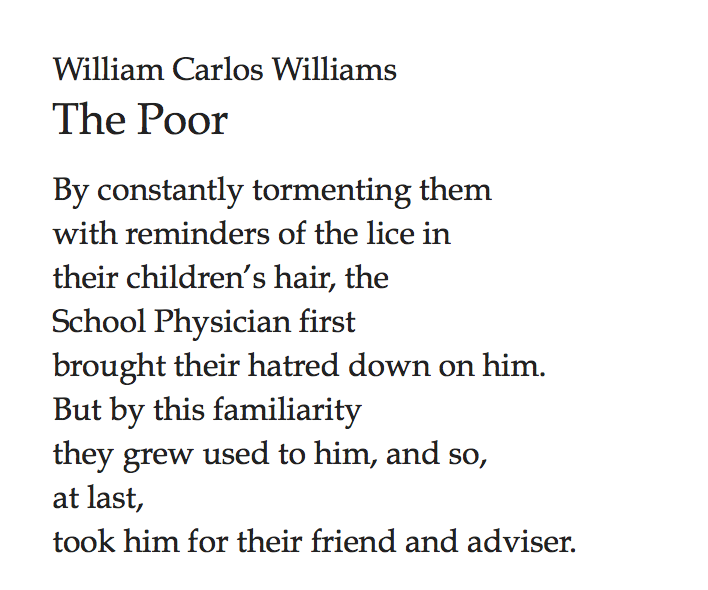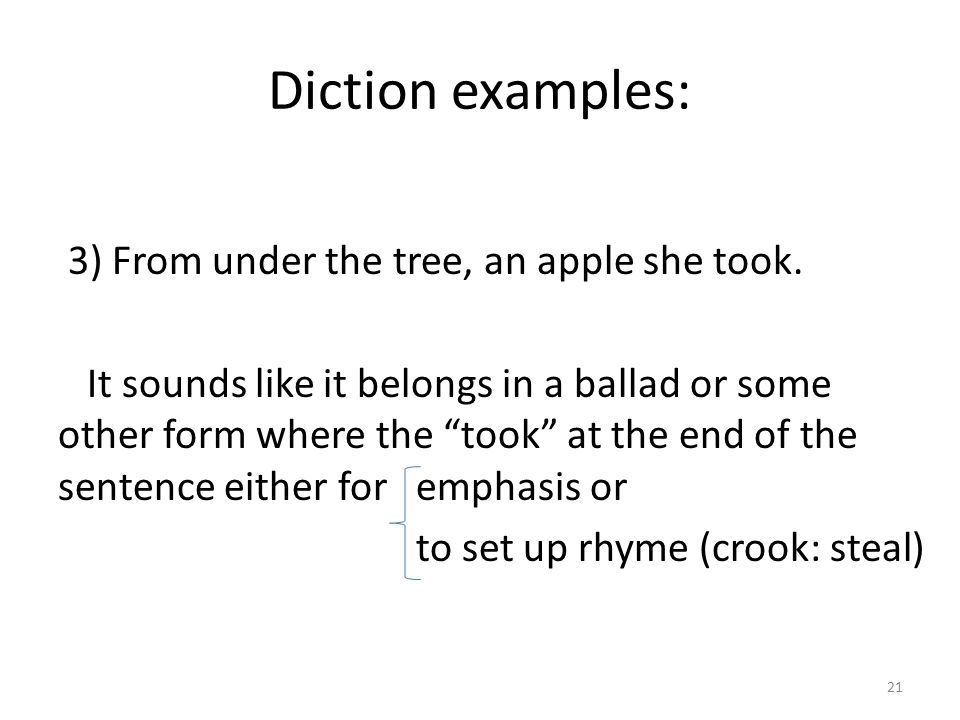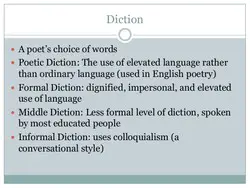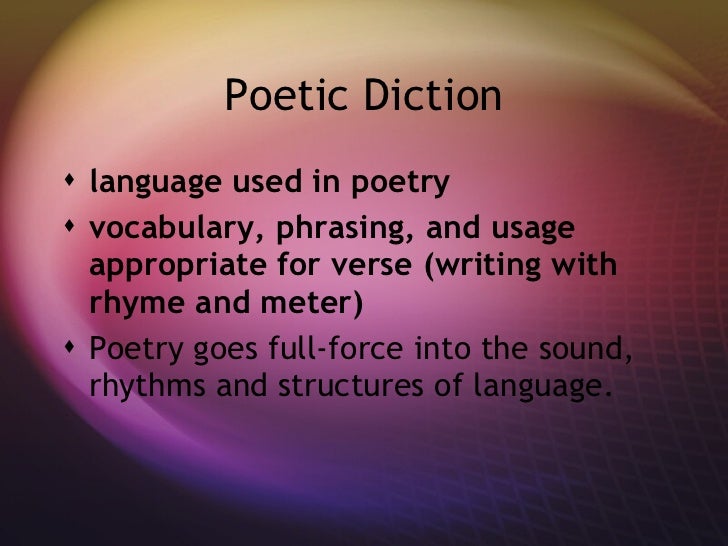Words serve multiple purposes given their presence and arrangement. Words can often serve multiple purposes given their presence and arrangement.
The speaker is usually striving to sound smart.
What is diction in poetry. Diction is the choice and the order of the words within a poem. What information might a reader derive or even guess at from their speech patterns. They shape and change the readers perceptions.
They create the color and texture of the written work. Diction is referred as a style of writing or speaking decided by the writers or speakers. It involves the vocabulary the phrasing and the grammar considered appropriate and inappropriate to poetry at different times.
As a result the poem as a whole can often be read on many different levels. Diction is word choice or the style of speaking that a writer speaker or character uses. This is when diction gets into dialect and poetry becomes that much more complex and stimulating.
Diction is a writers unique style of expression especially his or her choice and arrangement of words. This form of writing especially in poetry was much more popular in. Diction is essential in poetry as it defines the tone of a given work.
Words used should be used correctly so that the writer or speaker sounds intelligent. Poetic diction refers to the operating language of poetry language employed in a manner that sets poetry apart from other kinds of speech or writing. Often the vocabulary used in a poem with formal diction is complicated with elevated words and phrases.
Diction refers to the authors choice of words and the order of the words within a poem. Diction choice of words especially with regard to correctness clearness or effectiveness. Words are a writers primary tool.
Sometimes colloquial diction makes itself known through phrases or aphorisms. A writers vocabulary use of language to produce a specific tone or atmosphere and ability to communicate clearly with the reader are all essential parts of diction. In brief d iction is the selection of words that determines the level of writing.
Such as put your money where your mouth is or pass the buck. Depends on the diction. Diction is determined by vocabulary and syntax and it refers to the writers choice and ordering of words phrases sentence structures and figurative language like similes and metaphors.
Diction in poetry defines the tone and many aspects of the style of a given poetic work. Formal diction is somewhat self-explanatory as the word formal is in the title. In formal writing-essays speeches- diction should be formal.
Any of the four generally accepted levels of dictionformal informal colloquial or slangmay be correct in a particular context but incorrect in another or when mixed unintentionally. The diction that you use when you speak or write should be matched to purpose or audience. Unlike informal diction which contains contractions and other less-than-formal language formal diction consists of impersonal dignified and elevated uses of.
Diction or a writers choice of words has a particularly important place in poetry as the meaning sound and number of syllables in each word is often very important.
Https Www Jstor Org Stable 2718714
 Any Poem Comprehensive Poetry Assignment Addresses Diction Tone Mood Topic Theme Symbolism Imagery Shift Wr Writing Response Poetry Analysis Poems
Any Poem Comprehensive Poetry Assignment Addresses Diction Tone Mood Topic Theme Symbolism Imagery Shift Wr Writing Response Poetry Analysis Poems
 Adapted From Hill Scott Prose Analysis Diction Ppt Download
Adapted From Hill Scott Prose Analysis Diction Ppt Download
 Diction Poem Page 4 Line 17qq Com
Diction Poem Page 4 Line 17qq Com
 Diction Poem Page 1 Line 17qq Com
Diction Poem Page 1 Line 17qq Com
 Theory Of Poetic Diction Ppt Video Online Download
Theory Of Poetic Diction Ppt Video Online Download
 Explain This Poem And Expain The Poem S Dramatic S Chegg Com
Explain This Poem And Expain The Poem S Dramatic S Chegg Com
Imagery Tone And Word Of Choice
 Ppt Elements Of Poetry And Fiction Powerpoint Presentation Free Download Id 1559498
Ppt Elements Of Poetry And Fiction Powerpoint Presentation Free Download Id 1559498

 Introduction To Poetry Poetic Devices Terms The Repetition
Introduction To Poetry Poetic Devices Terms The Repetition
 Analysis Of Speaker And Diction In Poetry Youtube
Analysis Of Speaker And Diction In Poetry Youtube
The Emergence Of Literary Diction Journal Of Digital Humanities
Cari Blog Ini
Label
- 1800s
- 1820s
- 18th
- 1920s
- 50th
- about
- absence
- absent
- absolute
- abstract
- academic
- academy
- accelerated
- accent
- accents
- accept
- acceptance
- access
- account
- accounting
- accreditation
- accredited
- acronym
- acting
- active
- activities
- adaptation
- address
- addressing
- administration
- admission
- admissions
- adulta
- adults
- advantage
- advantages
- adverb
- adversity
- affairs
- affect
- africa
- after
- agencies
- agency
- agent
- agents
- airforce
- alarm
- alexander
- algebra
- allowed
- alpha
- alphabet
- amber
- america
- american
- americans
- analysis
- analyze
- anatomy
- ancient
- anglo
- animal
- anthropology
- anyone
- anything
- apartment
- apostles
- appalachian
- applicants
- application
- applied
- apply
- applying
- aptitude
- arabic
- architects
- area
- argument
- argumentative
- aristotle
- army
- arrive
- arrows
- article
- artifact
- artifacts
- artistry
- arts
- aruba
- assessment
- assessments
- assimilation
- assistant
- associate
- associates
- asterix
- asvab
- athletic
- attacked
- attend
- attention
- attila
- autobiographical
- autobiography
- average
- aztec
- bachelor
- bachelors
- back
- bags
- bald
- balls
- bank
- banking
- based
- beads
- beautiful
- because
- become
- becoming
- beginner
- beginners
- behavior
- behaviorism
- behaviors
- being
- beliefs
- bella
- below
- benchmark
- benefits
- best
- better
- between
- bible
- biochemistry
- biologists
- biology
- black
- blackbeard
- blend
- blends
- bloom
- boarding
- boats
- book
- boys
- brain
- breaker
- breakers
- breaking
- breaks
- broadcasting
- broker
- bronx
- bulb
- burlap
- business
- bypass
- caddos
- calculate
- calculating
- calculator
- calculus
- call
- called
- cameras
- campaign
- campbell
- canada
- candle
- candles
- capitalize
- card
- cardinal
- cardiologist
- cards
- care
- career
- caribbean
- catapult
- catapults
- catcher
- categorical
- cbest
- center
- central
- ceremony
- certificate
- certification
- challenges
- change
- changes
- changing
- character
- characteristics
- characters
- charlotte
- cheat
- check
- cheerleaders
- cheerleading
- chemical
- chemistry
- cherokee
- child
- choctaw
- choices
- choose
- chose
- christ
- christmas
- churches
- ciao
- city
- civilization
- claims
- class
- classes
- classroom
- clause
- clean
- cleanse
- closing
- clothes
- clothing
- coaches
- coalinga
- coast
- cogat
- college
- colleges
- colonies
- colony
- color
- colors
- comma
- commercial
- common
- communication
- communicator
- community
- competent
- completed
- components
- comprehension
- computer
- concept
- conclude
- concluding
- conclusion
- conclusions
- concrete
- conflicts
- conjugation
- cons
- consonant
- constructivism
- constructivist
- content
- contextual
- contract
- contrast
- contributions
- convert
- cooked
- cooking
- cool
- copy
- core
- cosmetology
- cost
- could
- council
- count
- countries
- course
- courses
- cover
- create
- created
- creating
- creative
- credibility
- credits
- criminal
- criterion
- critical
- critique
- cross
- cultural
- culture
- cultures
- cuny
- currency
- currently
- curriculum
- cursive
- curve
- curves
- custom
- customs
- cute
- cutting
- cypress
- dabate
- dallas
- damaging
- dance
- dangling
- data
- date
- dates
- deactivate
- deans
- debates
- decisions
- declaration
- decline
- decoding
- defensive
- definition
- definitions
- degree
- degrees
- delta
- democrats
- denny
- dependent
- dependents
- dermatologist
- descriptive
- deserve
- design
- designing
- development
- device
- devices
- diagnostic
- dialogue
- dialysis
- dibels
- diction
- difference
- differences
- different
- diploma
- directional
- director
- disabled
- disadvantages
- disciples
- discuss
- discussion
- divison
- doctor
- doctorate
- does
- donate
- donation
- donna
- dont
- dorm
- dorms
- double
- download
- dramatic
- draw
- drawing
- dream
- drop
- dual
- eagle
- earn
- easiest
- ecological
- ecology
- education
- effect
- egypt
- egyptian
- egyptians
- election
- elections
- electrical
- elementary
- elizabethan
- elongate
- emergency
- emory
- employees
- encoding
- ending
- engine
- engineer
- engineerig
- engineering
- england
- english
- enhanced
- entrance
- envelope
- enviorment
- environmental
- erase
- essay
- essays
- estate
- ethical
- ethics
- european
- evaluate
- events
- exactly
- exam
- example
- examples
- excel
- except
- expelled
- expenses
- experiment
- expository
- expulsion
- facs
- fact
- facts
- fafsa
- fail
- failed
- fair
- fake
- fall
- family
- farm
- fashion
- fasion
- faster
- features
- federal
- feudalism
- field
- files
- fill
- film
- final
- financial
- find
- fine
- finish
- finishing
- fire
- firenze
- first
- flag
- flakes
- flashlight
- fleur
- florida
- food
- foods
- football
- foreign
- forensic
- format
- forms
- foster
- founded
- four
- fourth
- framework
- free
- french
- freshman
- freshmen
- friendly
- friends
- from
- full
- function
- fund
- funded
- funny
- gaelic
- game
- games
- geds
- general
- genghis
- genres
- geography
- georgia
- german
- germany
- gesell
- getting
- give
- glasses
- globalization
- glue
- gmail
- goals
- gold
- good
- goodbye
- goodnight
- government
- gown
- gpas
- grabbers
- grade
- graders
- grades
- grading
- graduate
- graduates
- graduating
- graduation
- grammar
- grandchildren
- grant
- grants
- greece
- greek
- group
- growth
- guide
- guides
- guitar
- gulf
- gunsmithing
- gwam
- hair
- hand
- handed
- hands
- happens
- happy
- hard
- harvard
- have
- having
- hbcu
- head
- heading
- hebrew
- hellen
- hellenistic
- hello
- hemodialysis
- high
- higher
- highschool
- hills
- historically
- history
- hobbes
- home
- homecoming
- homes
- homeschool
- honor
- honorary
- honors
- hopkins
- hospital
- hospitality
- hours
- house
- housing
- however
- human
- humane
- humanitoes
- humans
- hvac
- icebreaker
- icebreakers
- idea
- idealism
- ideals
- ideas
- identify
- identifying
- immigrants
- impact
- impacts
- impeach
- imperialism
- importance
- important
- improve
- inaugural
- included
- income
- independence
- india
- indian
- indoor
- induction
- industrial
- influence
- Information
- initiation
- instead
- institute
- interactive
- interesting
- intergrated
- internship
- interpersonal
- intership
- interview
- into
- introduction
- introductions
- invented
- invention
- inventions
- invitation
- involve
- iranians
- ireland
- irish
- iroquois
- italian
- items
- jeffersonian
- jeopardy
- jersey
- jesuit
- jesus
- jobs
- join
- joining
- junior
- juniors
- justice
- kaplan
- kappa
- katana
- kaufman
- keller
- khan
- kids
- kill
- kind
- kindergarten
- know
- known
- labor
- lady
- language
- languages
- large
- last
- late
- latin
- lawyer
- league
- learn
- learned
- learning
- length
- lesson
- lessons
- letter
- letters
- level
- levels
- liberal
- license
- licensed
- life
- lifestyle
- light
- like
- limit
- list
- listening
- lists
- literacy
- literal
- literature
- little
- living
- loan
- loans
- local
- locker
- login
- long
- longer
- longitude
- look
- lords
- love
- luck
- macroeconomic
- made
- main
- mainstreaming
- major
- majors
- make
- makes
- making
- males
- manage
- management
- many
- marine
- marketing
- mascot
- maslow
- maslows
- master
- masters
- mates
- math
- matter
- mayor
- mcat
- mean
- meaning
- means
- media
- medical
- medicine
- medium
- memorize
- memory
- meps
- mesopotamian
- methods
- mexico
- middle
- migrant
- military
- mini
- minimum
- minor
- minute
- miss
- mitchell
- mnemonic
- mockingbird
- modeling
- models
- modern
- modernism
- modernist
- money
- monitor
- monitoring
- morning
- mortar
- most
- movie
- moving
- much
- multicultural
- multiple
- music
- musical
- name
- names
- national
- native
- nature
- navy
- nclex
- near
- need
- needed
- needs
- negative
- negro
- nelson
- neonatal
- netflix
- newspaper
- nkjv
- nominative
- norm
- nostalgic
- notification
- noun
- nouns
- nova
- number
- numbered
- nurse
- nurses
- nursing
- nusing
- obgyn
- object
- objective
- objects
- obtain
- occupational
- oceanographer
- offer
- ohio
- oneself
- online
- open
- opening
- operations
- optometry
- order
- outfitters
- outline
- overall
- overcoming
- overthrow
- pacer
- page
- paper
- papers
- paragraph
- part
- partial
- participle
- parts
- pass
- passing
- passive
- patients
- patterns
- paul
- pell
- penn
- people
- percent
- percentages
- percentile
- performance
- performing
- period
- persian
- personal
- perspective
- persuasive
- pharmacology
- pharmacy
- phoenix
- phonics
- photochemical
- photographic
- photography
- photos
- phrase
- physical
- physician
- physiology
- pictures
- pilot
- placement
- plan
- plant
- plasma
- plastic
- plato
- play
- plays
- pledge
- pledging
- plot
- plural
- poem
- poetry
- point
- pointillism
- pole
- polish
- popcorn
- popular
- population
- portfolio
- positive
- possessive
- post
- postcard
- practice
- predicate
- predicated
- preoperational
- prep
- prepare
- prepositional
- preschool
- preschoolers
- prescriptive
- presentation
- press
- pressure
- preterite
- prima
- primary
- printable
- printing
- priority
- private
- probability
- production
- products
- professor
- program
- programs
- progress
- project
- projects
- prom
- pronoun
- pronounce
- pronouns
- proofreading
- proportion
- pros
- protective
- psychology
- public
- puerto
- purpose
- puzzle
- quantitative
- quarter
- question
- questions
- quickly
- quintile
- quoting
- radiologist
- radiology
- raise
- raising
- range
- ratio
- reached
- reading
- realism
- reasons
- rebus
- recognition
- recognize
- recommendation
- referenced
- reflection
- reflective
- reflexive
- refuge
- regents
- regional
- regions
- register
- reinforcement
- reinforcer
- release
- reliability
- relic
- religion
- remember
- remove
- removing
- rent
- repair
- repay
- repeating
- replace
- report
- reports
- require
- required
- requirement
- requirements
- research
- residents
- respected
- respiratory
- results
- resume
- retake
- reunion
- reunions
- review
- revolution
- rhetorical
- rhit
- rica
- ride
- rituals
- rock
- role
- roles
- room
- root
- rotc
- rubric
- rules
- rush
- salaries
- sale
- same
- sample
- samples
- samurai
- sang
- sanskrit
- satire
- saxon
- scantron
- scared
- scene
- schol
- scholarship
- scholarships
- school
- schooling
- schools
- science
- score
- scores
- scoring
- scotland
- scottish
- seals
- second
- secondary
- section
- sectional
- security
- self
- sell
- sells
- send
- senior
- seniors
- sentence
- sequence
- sequential
- service
- setting
- setup
- sewn
- sheet
- shoe
- short
- should
- show
- siblings
- side
- sight
- sigma
- sign
- simple
- simularitys
- sized
- skill
- skills
- skip
- sleeves
- small
- smog
- social
- society
- software
- some
- someone
- someones
- song
- songs
- sorority
- sound
- sounds
- soup
- source
- spaces
- spanish
- speak
- speaker
- speakers
- speaking
- speech
- speeches
- spell
- spirit
- spoken
- sports
- square
- stages
- stamped
- stand
- standardized
- stanford
- start
- state
- statement
- statements
- states
- statistics
- stay
- steps
- sticks
- stna
- stoles
- stone
- stop
- stopped
- stories
- strategies
- strengths
- structures
- student
- students
- studies
- study
- style
- styles
- subject
- submit
- suffixes
- suite
- summarize
- summarizing
- summary
- summer
- sung
- surgeon
- survival
- suspended
- suspension
- swedish
- syllables
- symbol
- system
- systems
- table
- tables
- take
- talent
- talk
- tampa
- tassel
- tassels
- tbas
- teach
- teacher
- teachers
- teaching
- team
- teams
- technical
- technician
- technology
- teepee
- template
- tenses
- terminology
- terra
- test
- testing
- tests
- texas
- than
- thank
- that
- their
- theme
- themes
- theoretical
- theory
- there
- thesis
- things
- thought
- three
- tier
- tiers
- timberline
- time
- times
- tips
- title
- titles
- toastmasters
- today
- tone
- topics
- toys
- traditional
- training
- transcript
- transfer
- transferring
- transition
- translate
- translated
- treasurer
- trebuchet
- trenton
- trial
- tribes
- tribute
- trip
- tuition
- turning
- tutor
- tying
- type
- types
- typing
- ucla
- under
- undergraduate
- uniforms
- union
- united
- units
- universities
- university
- used
- using
- valedictorian
- validate
- validity
- value
- values
- variables
- varsity
- vassar
- verb
- verbal
- verbs
- verizon
- veteran
- veterinarian
- video
- videos
- view
- views
- viking
- villanova
- virginia
- voice
- volleyball
- vowel
- want
- warrant
- washington
- watch
- ways
- weaknesses
- weapons
- wear
- wearers
- weather
- weighted
- welfare
- were
- wesleyan
- west
- what
- whats
- wheel
- when
- where
- which
- while
- white
- whom
- widow
- wigs
- will
- window
- windows
- with
- without
- women
- wonderlic
- word
- words
- work
- workers
- works
- world
- worry
- worship
- worth
- write
- writing
- xenia
- xray
- year
- yearbooks
- years
- yellow
- york
- young
- your







